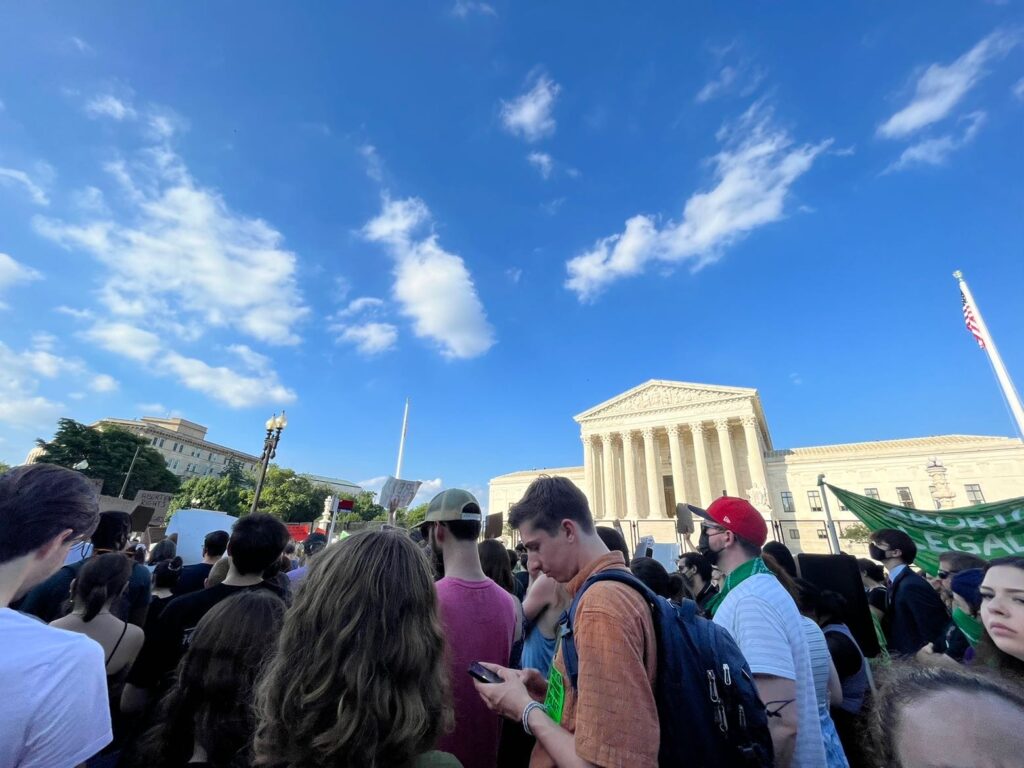
The Supreme Court ruled against the nearly 50-year-old constitutional right to abortion on June 24, but Ferris students believe the work is not over.
As Gov. Gretchen Whitmer explained in a press release following SCOTUS’ ruling in Dobbs v. Jackson Women’s Health Organization, the fate of abortion rights in Michigan is currently unknown.
A lawsuit filed by Planned Parenthood Michigan and Dr. Sarah Wallet and a preliminary injunction from the Michigan Court of Claims now temporarily block a 1931 abortion ban that lacks exceptions for instances of rape or incest. While Whitmer plans to “fight like hell,” urging the Michigan Supreme Court to resolve whether the state’s constitution protects abortion rights, Ferris students participate in a fight of their own
Social work sophomore Alyssa Alley is taking her cause to the streets by spreading awareness for organizations committed to reproductive rights. These include the Midwest Access Coalition, Reclaim MI WIN Fund and Self-Managed Abortion; Safe and Supported. She also seeks out conversations with others to find common ground.
“I just sat down with a gentleman while I was handing out pamphlets in Big Rapids who said, ‘How can you be okay with killing babies?’ and him and I had a two-hour conversation over coffee about my experience in the foster system,” Alley said.
After growing up in the Missouri foster care system and watching a friend nearly die at the hands of a Catholic hospital that refused to terminate a life-threatening pregnancy, Alley was as prepared for this ruling as she was “disheartened.”
Elementary education junior Haley Trojan and psychology junior Lauryn Coleman felt “hurt,” “infuriated” and “saddened by our government” after the ruling. Coleman grew up in an area where poverty, teen pregnancy and homelessness were common.
“I will never understand why allowing individuals the chance to choose what happens with their bodies, specifically in pregnancy, is someone else’s decision,” Coleman said. “Women receive abortions for multiple reasons, and although some may be more ‘justifiable’ to society, a woman truly needs no justification as to why she wants this procedure done.”
Both Trojan and Coleman encourage people to spend time educating themselves on “pro-choice” and “pro-life” stances in order to engage in well-informed conversations. They believe that open communication and sincere listening is key to moving forward.
The registered student organization Protect Life, known for their displays on Robinson Quad and events such as Stump a Pro-Lifer, submitted an official comment to the Torch. Their work continues as they pledge to maintain involvement with Life Resources, Big Rapids’ free and confidential pregnancy center, and advocate for thousands of other pregnancy centers across the country. They plan to work until abortion is “illegal,” “undesirable” and “unthinkable.”
Protect life views the overturning of Roe V. Wade as a “tremendous victory for all human rights activists in the US.” They are not surprised by the mass dissent shown by fellow Americans, as “pushback” historically occurs when laws are enacted “to support a marginalized people group,” the marginalized group in this case being unborn.
History professor Dr. Tracy Busch offered context for a country without guaranteed reproductive rights, explaining that abortion was legal in every state when the Constitution was passed. State-wide abortion bans first appeared in 1821, with the anti-abortion movement growing alongside the Protestant religious revival known as the Second Great Awakening. Busch sees a “direct connection between religious activism and the trammeling of female bodily autonomy.”
“June 24, 2022, revealed to me that the idea of gender equality is a fiction in our country,” Busch said.
The future of abortion in the state of Michigan is unknown, but passion and motivation among young people on Ferris’ campus remains constant.
